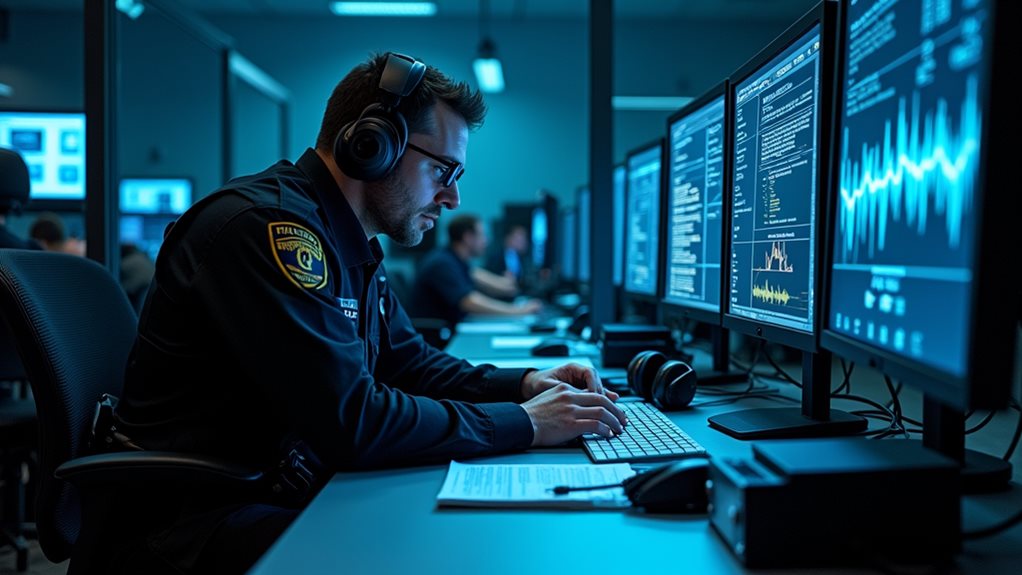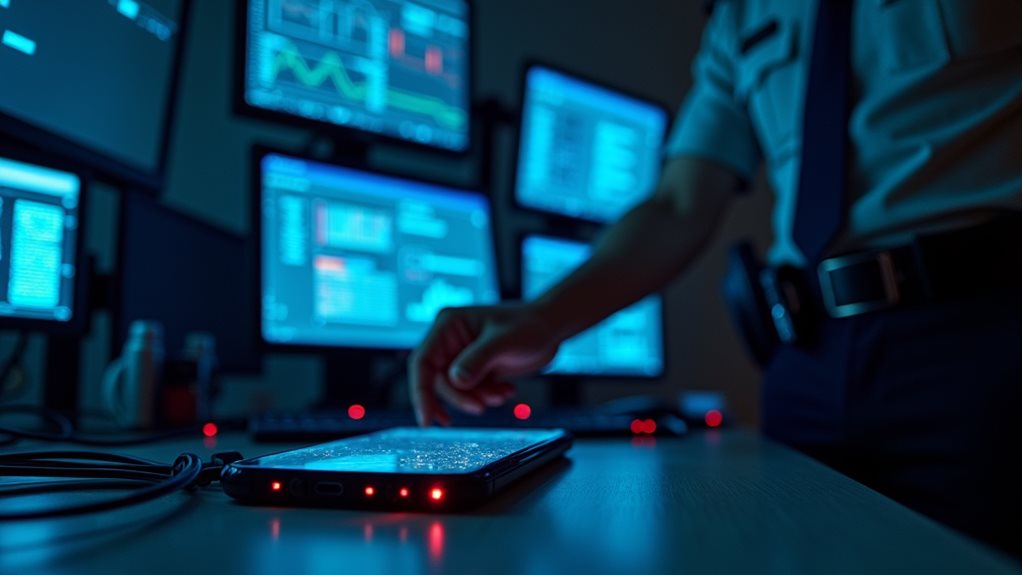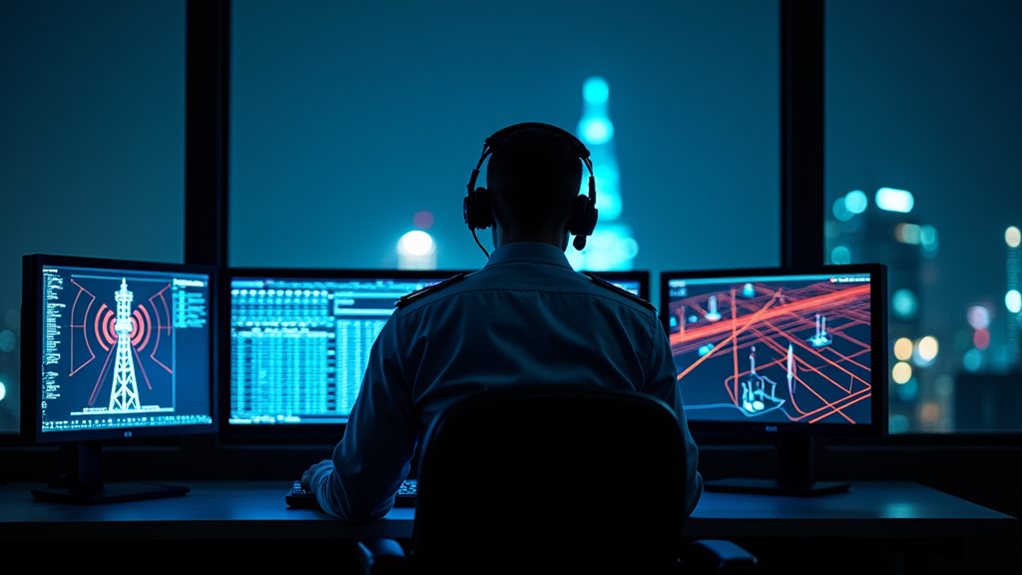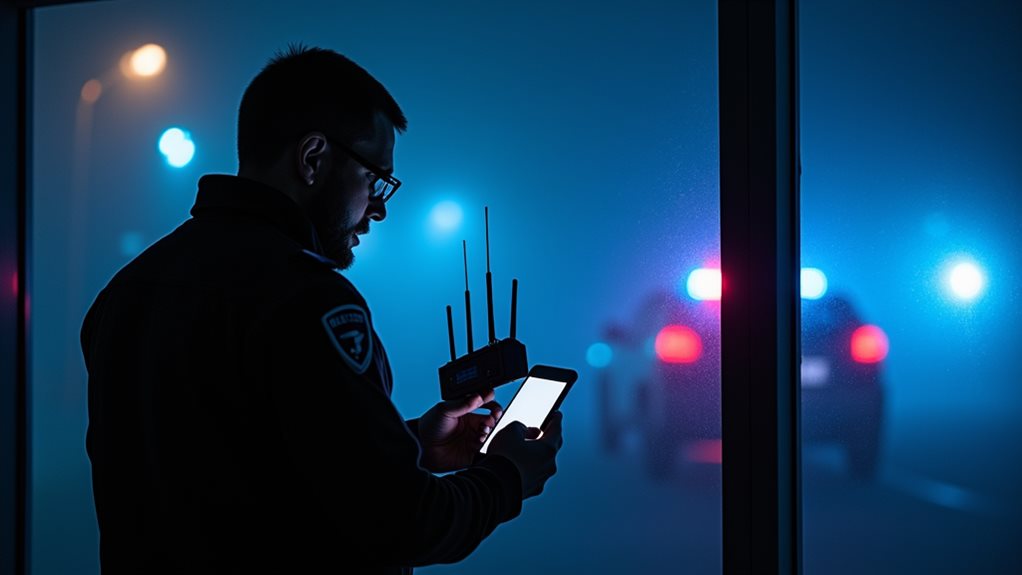Police can't legally listen to your phone conversations without first obtaining a warrant based on probable cause, thanks to protections under the Wiretap Act and Fourth Amendment. You're protected from unauthorized surveillance of your calls, texts, and location data unless law enforcement proves it's necessary for their investigation and gets proper judicial approval. While emergency exceptions exist for life-threatening situations, officers must still obtain a warrant within 48 hours. Violations can result in hefty fines and prison time, with illegally obtained evidence being inadmissible in court. Understanding your digital privacy rights can help you better protect your communications.
Legal Requirements for Phone Surveillance
When it comes to phone surveillance, law enforcement must follow strict federal guidelines established by the Wiretap Act. You'll be glad to know that phone interception isn't something police can do without proper authorization, as the law protects your rights against unauthorized monitoring of your communications.
Before law enforcement can listen to your calls or intercept your messages, they need to obtain a warrant based on probable cause. This process involves detailed procedural steps, and if they don't follow these requirements, they could face serious legal ramifications, including case dismissal. A typical wiretap warrant is valid for 30 days. The Supreme Court's Riley v. California decision has reinforced privacy protections for cell phones and digital devices. In many VoIP cases, establishing strong encryption methods is crucial to prevent unauthorized access.
While there are some exceptions for emergency situations or investigations of specific felonies, these are carefully scrutinized by courts. You should understand that police can apply for wiretaps when investigating serious crimes like murder, kidnapping, or drug trafficking.
However, they can't simply start listening to your conversations without proper authorization. Even when officers try to obtain consent for searching phones to bypass the warrant process, you maintain your constitutional rights under the Fourth Amendment, which protects you from unreasonable searches and seizures.
Your Constitutional Privacy Rights
These legal requirements for police surveillance stem directly from your constitutional rights, particularly those guaranteed by the Fourth Amendment. When it comes to your phone communications and location data, you're protected by powerful constitutional safeguards that necessitate law enforcement to obtain a warrant before accessing your sensitive information.
Your reasonable expectation of privacy extends to various forms of electronic data, including your cell phone location information, call records, and text messages. The Supreme Court has recognized that this information can reveal intimate details about your life, which is why they've established strict rules about how law enforcement can access it. This protection was reinforced through a landmark 5-4 decision in the Carpenter v. United States case. The framers of the Constitution created these protections over 200 years ago, well before they could envision modern communication technologies. Additionally, neglecting to secure VoIP systems can expose vulnerabilities that may be exploited without proper legal safeguards.
The privacy implications of cell phone tracking are so significant that police can't simply collect this data without proper legal authorization.
You should know that these protections apply even when your data is held by third parties like your phone carrier. While there are some emergency exceptions, law enforcement typically needs to demonstrate probable cause and obtain a warrant before they can monitor your phone activities.
These requirements guarantee that your constitutional right to privacy remains protected in our increasingly digital world.
Wiretapping Rules and Restrictions

Your phone conversations are protected from police surveillance unless they've obtained a proper warrant based on probable cause that you're involved in criminal activity.
Violations of these wiretapping rules can result in severe criminal penalties including up to 5 years in prison and $250,000 in fines.
While officers must follow strict rules about what they can listen to and for how long, there's an important exception that allows emergency wiretapping if they believe someone's life is in immediate danger.
You'll want to understand that any evidence collected through illegal wiretapping can't be used against you in court, which serves as a key protection of your privacy rights. Police also can use pen register devices to track the phone numbers you dial without needing a wiretap order.
Legal Warrant Requirements
Police officers must navigate strict legal requirements before tapping into anyone's phone conversations. When submitting a warrant application, they'll need to demonstrate probable cause that the wiretap will uncover evidence of serious criminal activity.
You'll be glad to know that these stringent requirements protect your privacy rights while allowing law enforcement to conduct necessary investigations.
Here's what you need to know about the legal requirements for phone surveillance:
- Law enforcement must prove that other investigative methods have failed or wouldn't be effective.
- Judges carefully review each request and set specific limitations on duration and scope.
- The warrant can't exceed 30 days without requiring a new application.
- Officers must minimize listening to conversations unrelated to their investigation.
The process isn't as simple as you might see in TV shows. Officers need authorization from high-ranking officials, like the Attorney General, and must provide detailed documentation of their investigation.
They're required to specify exactly what they're looking for and why traditional surveillance methods aren't sufficient. These requirements guarantee that your privacy rights are protected while allowing legitimate law enforcement activities to proceed. Basic tracking of phone numbers through pen registers and trap-and-trace devices doesn't require a warrant, though listening to actual conversations does. Violations of these requirements can result in criminal felony charges for unauthorized wiretapping.
Emergency Exception Guidelines
In contrast to normal warrant requirements, federal law permits emergency wiretapping without prior court approval in specific life-threatening situations.
You'll find these emergency wiretaps are strictly regulated, with law enforcement needing to prove immediate dangers like death threats, national security risks, or organized crime activities that can't wait for standard procedures.
While this might sound concerning, there are strict surveillance limitations to protect your rights. Law enforcement must still obtain a warrant within 48 hours of starting the emergency surveillance, and if they don't get approval, any information they've collected becomes inadmissible. The monitoring must specifically relate to substantial property threats as outlined in the Wiretap Act.
You're protected by specific guidelines that only allow designated officers, typically authorized by the Attorney General or state prosecutors, to initiate these emergency intercepts.
It's important to understand that misusing these emergency provisions carries serious consequences for law enforcement. If they can't justify the emergency or fail to get that warrant within 48 hours, they're facing potential criminal charges and civil liability.
You can rest easy that courts scrutinize these cases carefully to guarantee your privacy rights aren't being violated without legitimate cause.
Phone Privacy Protections
Most phone conversations in America are protected by strict wiretapping laws that require law enforcement to follow specific protocols before listening in.
Your privacy expectations are safeguarded by both federal and state regulations that determine when and how authorities can monitor your calls. While some states operate under phone consent laws requiring all parties to agree to recording, others need only one party's permission.
To protect your rights, law enforcement must meet these essential requirements before monitoring your calls:
- Obtain a court-authorized wiretap order, similar to a search warrant
- Demonstrate probable cause that the wiretap will uncover evidence of serious crimes
- Prove that other investigative methods won't suffice to gather needed evidence
- Specify the duration and scope of the proposed surveillance
You'll find additional protection under the Electronic Communications Privacy Act, which regulates how your electronic and oral communications can be intercepted. Violations of wiretapping laws can result in criminal and civil penalties.
This means police can't randomly listen to your calls without proper authorization, and they must justify their need for surveillance.
If you're concerned about workplace monitoring, remember that while employers can monitor business calls, they must respect the privacy of your personal conversations.
Emergency Phone Monitoring Exceptions
Federal law carves out specific exceptions for emergency phone monitoring through the Telephone Consumer Protection Act (TCPA), which allows certain organizations to make calls or send texts without prior consent during urgent situations.
You'll find these emergency exemptions particularly relevant during health crises, natural disasters, or other public safety concerns, where monitoring regulations adapt to protect your wellbeing.
When it comes to COVID-19, you're protected by specific guidelines that determine who can contact you and why. Only healthcare providers, hospitals, and government officials can reach out, and they must stick to sharing vital information about the outbreak.
You won't receive marketing calls or sales pitches under this exception – it's strictly for your safety and health.
The courts have consistently supported these emergency provisions, especially for essential communications like school closure notifications, utility outage updates, and urgent pharmacy messages.
While you might wonder about privacy concerns, remember that these exceptions are narrowly defined and closely monitored by the FCC to prevent abuse.
They're designed to keep you informed during critical situations while still protecting your privacy rights.
Cell Phone Data Protection

Your phone's data protection has evolved considerably through court decisions that now require law enforcement to obtain warrants before accessing your digital information.
You'll find that modern privacy requirements have established clear boundaries between your rights and police authority, making unauthorized access to your cell phone data increasingly difficult.
While there are notable cases like Riley v. California that have strengthened these protections, you should still maintain strong security measures since law enforcement can access your device with proper legal authorization.
Legal Privacy Requirements Today
Modern cell phone privacy hinges on a complex network of laws and regulations designed to protect your digital information. When you're maneuvering through today's privacy challenges, it's essential to understand that your rights are protected by multiple layers of legislation, including the Electronic Communication Privacy Act and the Fourth Amendment.
As technology evolves, you'll find that legal implications surrounding phone privacy continue to adapt. The landmark Carpenter v. United States ruling in 2018 strengthened your privacy protections by requiring law enforcement to obtain warrants for accessing your location data.
Here are the key privacy protections you're entitled to:
- Law enforcement must obtain a warrant to search your phone's contents after an arrest.
- Police need court authorization to access your real-time location data.
- You have the right to opt out of sharing data with third parties.
- Written permission is required for companies to send you marketing messages.
You're not alone in managing these privacy concerns. The TCPA, ECPA, and other regulations work together to safeguard your digital communications, ensuring that your personal information remains protected in an increasingly connected world. Additionally, understanding the impact of data protection laws is crucial for navigating your rights in this evolving landscape.
Warrants for Phone Access
Three key requirements govern law enforcement's access to your cell phone data. First, police must obtain a judicial warrant based on probable cause before searching your phone.
Second, warrant specificity is essential – the search must be narrowly tailored to find specific evidence related to the crime being investigated.
Third, officers must follow strict protocols to protect your privacy rights under the Fourth Amendment.
You should know that police can execute a temporary seizure of your phone if they believe it contains evidence of a crime, but they'll still need to obtain a warrant before searching its contents.
While there are some exceptions to the warrant requirement, such as when you voluntarily consent to a search, your privacy rights generally remain protected by law. The Electronic Communication Privacy Act and various state regulations work together to safeguard your digital information.
If law enforcement wants to access your phone records or data, they typically need proper authorization through warrants, subpoenas, or court orders.
Your service provider must keep your information private unless legally compelled to share it.
Data Protection Court Cases
Several landmark court cases have shaped how law enforcement can access and use cell phone data.
You'll find that courts have become increasingly protective of cell phone privacy, especially after cases like *Carpenter v. United States*, which established that police need a warrant to access your historical location data.
When it comes to data extraction, courts now carefully scrutinize requests to guarantee they're not overly broad or invasive.
Here's what you need to know about your rights under current legal precedents:
- Police can't search your phone without a warrant or your specific consent, even if you've "abandoned" the device.
- If you give consent for a search, it must be limited to exactly what you've agreed to.
- Courts can restrict data collection to specific time periods relevant to an investigation.
- Law enforcement must demonstrate why the data they're seeking is relevant to their case.
The case of *In re Kuraray America, Inc.* showed just how expensive unrestricted data collection can be, with costs reaching $3.8 million.
That's why courts now typically require narrowly tailored searches that protect both your privacy and law enforcement's legitimate needs.
Digital Evidence Collection Standards
During criminal investigations, digital evidence collection must follow rigorous standards to secure its admissibility in court. You'll find that law enforcement agencies can't simply gather digital evidence however they want – they need to follow specific protocols that protect both the evidence and your rights.
When police examine your devices, they're required to detail their approach in search warrants, specifying exactly what they're looking for and how they'll obtain it. They'll consider factors like your technical expertise and use specialized tools to prevent data tampering.
If you're concerned about your privacy, you should know that these collection standards include strict documentation requirements and preservation methods.
You'll be interested to learn that mobile device forensics has its own set of requirements. Law enforcement must use forensically sound methods to extract data, and they're required to stay current with evolving technologies.
Additionally, they may analyze communication data, including VoIP call logs, to ensure comprehensive investigation outcomes.
The standards also secure that your privacy rights are protected through ethical guidelines and legal frameworks. Remember, these protocols aren't just bureaucratic red tape – they're essential safeguards that protect both your rights and the integrity of any evidence collected.
Police Technology and Surveillance

- Your phone can be tracked through StingRay devices that mimic cell towers, allowing police to pinpoint your location and intercept basic data.
- Law enforcement can use mobile forensic tools to extract your messages, photos, browsing history, and even deleted content.
- Police can obtain historical location data from cell towers through court orders or warrants.
- Remote monitoring software can be deployed to track your real-time activities and communications.
While these surveillance methods often require legal authorization, the technology's reach continues to expand. Additionally, traceable VoIP calls ensure that communications can be monitored and linked to individuals when necessary.
Understanding these capabilities isn't about paranoia – it's about being informed of how your digital footprint can be accessed and monitored. As surveillance tools become more sophisticated, staying aware of these technologies helps you make informed decisions about your digital privacy.
Civil Liberty Safeguards
Strong civil liberty safeguards protect your constitutional rights against unauthorized phone surveillance.
You'll be glad to know that the Supreme Court unanimously ruled that police must obtain a warrant before searching your cell phone, recognizing the essential role of cell phone privacy in modern life.
Your Fourth Amendment rights extend into the digital domain, protecting you from unreasonable searches and seizures of your electronic data.
Organizations like the ACLU actively work to defend your privacy by challenging government surveillance programs and advocating for stricter digital surveillance ethics.
These protections guarantee that law enforcement can't freely access your location data or personal information without proper legal authority.
When it comes to your phone's data, you're protected by clear legal boundaries.
Police must either obtain your explicit consent or secure a warrant before searching your device.
While law enforcement may use advanced technologies like Mobile Device Forensic Tools, your constitutional rights remain intact.
Frequently Asked Questions
Can Police Access Deleted Text Messages From My Phone?
Yes, police can access your deleted messages through forensic data recovery tools, but they'll need a warrant first. Your texts might still exist in phone storage or cloud backups even after you delete them.
How Long Can Police Legally Monitor Someone's Phone Conversations?
Your phone conversations can be legally monitored through a wiretap for up to 30 days initially. You should know that police must meet strict legal requirements and can request extensions if they show continued necessity.
Do Police Need Special Equipment to Track Prepaid Disposable Phones?
Yes, police need specialized equipment like cell site simulators and tracking systems to monitor prepaid phones effectively. You'll find they must overcome disposable phone limitations through advanced technology and proper legal authorization.
Can Police Listen Through a Phone's Microphone Even When Not Calling?
Yes, through microphone hacking, law enforcement can remotely activate your phone's mic, even when it's off. You should know they'll need court approval first, though this practice still raises significant privacy concerns.
Does Putting My Phone in Airplane Mode Prevent Police Surveillance?
While airplane mode limits some tracking, it won't fully protect you from surveillance technology. For better security, you'll need additional measures like removing your battery or using encrypted communication tools.
Final Thoughts
You'll want to stay informed about your constitutional privacy rights while understanding that law enforcement's ability to monitor phones isn't unlimited. Remember that police generally need warrants for wiretaps and surveillance, though emergency exceptions exist. To protect yourself, use secure communication methods, know your rights to refuse warrantless searches, and consult legal counsel if you're concerned about surveillance. Digital privacy requires constant vigilance in today's connected world.

